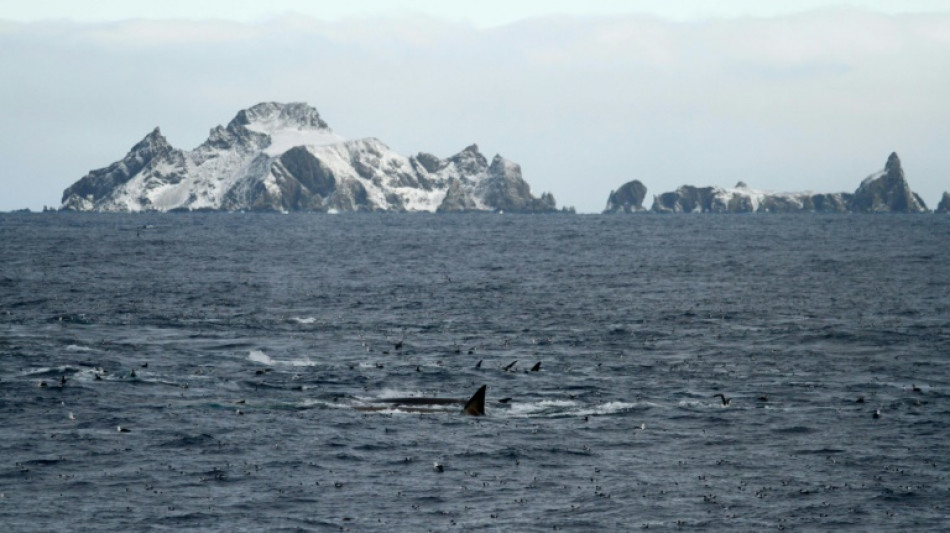
-
 IAEA chief tours sensitive Iran nuclear plants
IAEA chief tours sensitive Iran nuclear plants
-
Pompeii rejects 'mass tourism' with daily visitor limit

-
 Jailed Russian poet could be 'killed' in prison, warns wife
Jailed Russian poet could be 'killed' in prison, warns wife
-
French court orders release of Lebanese militant held since 1984

-
 Global stocks struggle after Fed signals slower rate cuts
Global stocks struggle after Fed signals slower rate cuts
-
UK economy slows, hitting government growth plans

-
 Primary schools empty as smog persists in Indian capital
Primary schools empty as smog persists in Indian capital
-
Palestinians turn to local soda in boycott of Israel-linked goods

-
 Typhoon Man-yi bears down on Philippines still reeling from Usagi
Typhoon Man-yi bears down on Philippines still reeling from Usagi
-
UK growth slows in third quarter, dealing blow to Labour government

-
 Chris Wood hits quickfire double in NZ World Cup qualifying romp
Chris Wood hits quickfire double in NZ World Cup qualifying romp
-
Markets struggle at end of tough week

-
 China tests building Moon base with lunar soil bricks
China tests building Moon base with lunar soil bricks
-
Film's 'search for Palestine' takes centre stage at Cairo festival

-
 Oil execs work COP29 as NGOs slam lobbyist presence
Oil execs work COP29 as NGOs slam lobbyist presence
-
Gore says climate progress 'won't slow much' because of Trump

-
 'Megaquake' warning hits Japan's growth
'Megaquake' warning hits Japan's growth
-
Stiff business: Berlin startup will freeze your corpse for monthly fee

-
 Wars, looming Trump reign set to dominate G20 summit
Wars, looming Trump reign set to dominate G20 summit
-
Xi, Biden attend Asia-Pacific summit, prepare to meet

-
 Kyrgios to make competitive return at Brisbane next month after injuries
Kyrgios to make competitive return at Brisbane next month after injuries
-
Dominican Juan Luis Guerra triumphs at 25th annual Latin Grammys

-
 Landslide win for Sri Lanka president's leftist coalition in snap polls
Landslide win for Sri Lanka president's leftist coalition in snap polls
-
Australian World Cup penalty hero Vine takes mental health break

-
 As Philippines picks up from Usagi, a fresh storm bears down
As Philippines picks up from Usagi, a fresh storm bears down
-
Tropical Storm Sara pounds Honduras with heavy rain

-
 Pepi gives Pochettino win for USA in Jamaica
Pepi gives Pochettino win for USA in Jamaica
-
'Hell to heaven' as China reignite World Cup hopes with late winner

-
 Rebel attacks keep Indian-run Kashmir on the boil
Rebel attacks keep Indian-run Kashmir on the boil
-
New Zealand challenge 'immense but fantastic' for France

-
 Under pressure England boss Borthwick in Springboks' spotlight
Under pressure England boss Borthwick in Springboks' spotlight
-
All Blacks plan to nullify 'freakish' Dupont, says Lienert-Brown

-
 TikTok makes AI driven ad tool available globally
TikTok makes AI driven ad tool available globally
-
Japan growth slows as new PM readies stimulus

-
 China retail sales pick up speed, beat forecasts in October
China retail sales pick up speed, beat forecasts in October
-
Asian markets fluctuate at end of tough week

-
 Gay, trans people voicing -- and sometimes screaming -- Trump concerns
Gay, trans people voicing -- and sometimes screaming -- Trump concerns
-
Argentina fall in Paraguay, Brazil held in Venezuela

-
 N. Korean leader orders 'mass production' of attack drones
N. Korean leader orders 'mass production' of attack drones
-
Pakistan's policies hazy as it fights smog

-
 Nature pays price for war in Israel's north
Nature pays price for war in Israel's north
-
New Zealand's prolific Williamson back for England Test series

-
 Mexico City youth grapple with growing housing crisis
Mexico City youth grapple with growing housing crisis
-
After Trump's victory, US election falsehoods shift left

-
 Cracks deepen in Canada's pro-immigration 'consensus'
Cracks deepen in Canada's pro-immigration 'consensus'
-
Xi inaugurates South America's first Chinese-funded port in Peru

-
 Tyson slaps Paul in final face-off before Netflix bout
Tyson slaps Paul in final face-off before Netflix bout
-
England wrap-up T20 series win over West Indies

-
 Stewards intervene to stop Israel, France football fans clash at Paris match
Stewards intervene to stop Israel, France football fans clash at Paris match
-
Special counsel hits pause on Trump documents case

| RBGPF | 100% | 61.84 | $ | |
| CMSC | -0.24% | 24.55 | $ | |
| SCS | -0.75% | 13.27 | $ | |
| BP | 1.65% | 29.05 | $ | |
| CMSD | -0.02% | 24.725 | $ | |
| GSK | -2.09% | 34.39 | $ | |
| RIO | -0.31% | 60.43 | $ | |
| NGG | 0.4% | 62.37 | $ | |
| BCC | -1.57% | 140.35 | $ | |
| BTI | 0.2% | 35.49 | $ | |
| RYCEF | -4.71% | 6.79 | $ | |
| RELX | -0.37% | 45.95 | $ | |
| BCE | -1.38% | 26.84 | $ | |
| JRI | -0.23% | 13.21 | $ | |
| VOD | -0.81% | 8.68 | $ | |
| AZN | -0.38% | 65.04 | $ |

Huge groups of fin whales sign of hope for ocean giants
For the first time since whaling was banned, dozens of southern fin whales have been filmed feasting together in a "thrilling" Antarctic spectacle, hailed by scientists Thursday as a sign of hope for the world's second largest animal.
The ocean giants are second only to blue whales in length, with slender bodies that help them glide through the water at high speed.
They could not evade industrial whaling, however, and were slaughtered to near-extinction during the 20th Century as hunters systematically shattered populations of whales across the planet.
"They were reduced to one or two percent of their original population size," said Helena Herr, of the University of Hamburg, lead author of the research published in the journal Scientific Reports.
"We're talking about a couple of thousand animals left for the whole southern hemisphere area."
While scientists say numbers of southern fin whales have been slowly rebounding since a 1976 whaling ban, there have been few sightings of these mysterious animals in large groups at their historic feeding grounds.
But in scenes that Herr described as "one of nature's greatest events", researchers and filmmakers were able to capture footage of up to 150 southern fin whales in Antarctica.
Drone footage, shot by wildlife filmmakers from the BBC, shows the fin whales swooping and lunging through the water, blasting great bursts of air as they surface, as birds wheel in the sky above them.
"The water around us was boiling, because the animals were coming up all the time and causing splashes," Herr told AFP.
"It was thrilling, just standing there and watching it."
Unofficially, the team nicknamed it the "fin whale party" as the enormous creatures feasted on swirling masses of krill.
In two expeditions in 2018 and 2019, researchers recorded a hundred groups of fin whales, ranging from small gatherings of a few individuals, to eight huge congregations of up to 150 animals.
Previously, recorded feeding groups had a maximum of around a dozen whales.
Using data from their surveys, the authors estimate that there could be almost 8,000 fin whales in the Antarctic area.
- 'Ecosystem engineers' -
Fin whales can live to around 70 or 80 years old when left alone and have just one calf at a time, so Herr said the recovery of populations is a slow process.
She said increasing numbers of southern fin whales is an encouraging sign that conservation measures can work, although she noted that other threats include being struck by boats.
The International Union for Conservation of Nature now lists fin whales as "vulnerable" and estimates the global population as 100,000, with most of these in the northern hemisphere.
More whales could also be a good sign for the health of the ocean more generally -- and even efforts to tackle climate change.
Whales feed on iron-rich krill but they also defecate in the surface waters -- returning nutrients to the ocean that help spark the growth of tiny phytoplankton, the foundation of the marine food web.
Like plants on land, phytoplankton photosynthesise using the sun's rays to turn carbon dioxide into energy and oxygen.
They are "ecosystem engineers", said Herr, who first spotted a large group of the whales by chance in 2013 during a research mission into Antarctic Minke whales.
She now plans more missions to investigate the enduring mystery of these ocean giants -- where they breed.
"We don't know where they go," said Herr, adding that much more is known about the fin whales of the northern hemisphere.
Herr's team was able to put satellite tags on four animals last year, but a mission to go back to the Antarctic with more tracking equipment has been delayed until next year by the pandemic.
- Exploitation -
This elusiveness is even more astonishing given the size of fin whales.
The animals can grow up to around 27 metres (88 feet), although Herr said that they now tend to average 22 metres, particularly after whaling that targeted the biggest creatures.
In all some 700,000 individual fin whales were killed during the 20th century for the oil in their body fat.
All populations of whales in the region were ravaged, from the biggest blue whales down to the smallest minke whales until commercial hunting was stopped in a series of agreements in the 1970s and 1980s.
"It's an example of how humanity treats resources," said Herr.
"They just exploit them as long as they can and only stop when it's not commercially valuable anymore. As long as you can make profit, it will be exploited."
T.Perez--AT



